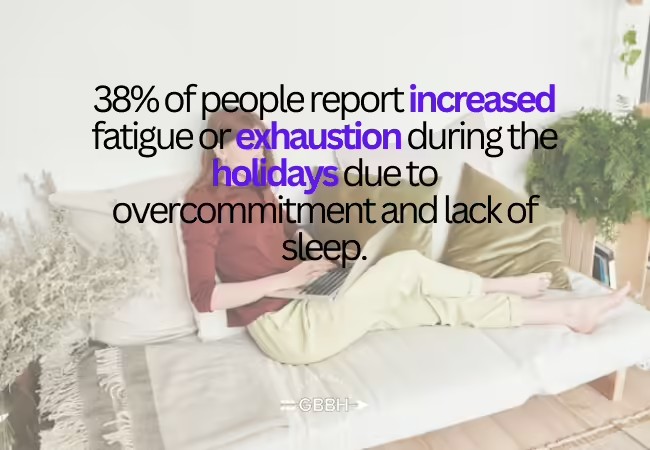The holiday season is often portrayed as a time of joy, celebration, and togetherness. However, for many, this time of year can bring significant stress, anxiety, and emotional challenges. From financial pressures and time constraints to navigating family dynamics and coping with loneliness or grief, holiday stress is a common yet manageable experience.
For individuals in Boston, accessing professional mental health resources, such as an Anxiety Treatment Program, Depression Treatment Program, or trauma-focused therapy through a Mental Health Treatment Center in Boston, can provide the tools and support needed to navigate the holidays with greater ease. This comprehensive guide explores the common stressors of the holiday season, their impact on mental health, and actionable strategies to help you thrive during this busy time.
Common Holiday Stressors
While the holidays are often filled with traditions and gatherings, they also come with unique challenges that can impact emotional and mental well-being.
1. Financial Pressures
- Gift-Giving Expenses: The pressure to buy gifts for family, friends, and coworkers can lead to financial strain.
- Travel and Hosting Costs: Traveling to see loved ones or hosting holiday gatherings can quickly add up.
- Comparison Culture: Social media and societal expectations may amplify feelings of inadequacy or the need to overspend.
2. Time Management Challenges
- Busy Schedules: Balancing work, holiday preparations, and social events can feel overwhelming.
- Lack of Downtime: The hustle and bustle of the season often leave little room for relaxation or self-care.
3. Family Dynamics
- Conflict or Tension: Reuniting with family may bring unresolved conflicts or strained relationships to the surface.
- Unrealistic Expectations: The pressure to create a “perfect” holiday experience can increase anxiety.
4. Loneliness or Grief
- Feelings of Isolation: Those without close family or friends may feel lonely during a time focused on togetherness.
- Coping with Loss: Memories of loved ones who have passed away can resurface, amplifying feelings of grief and sadness.
5. Overstimulation
- Crowded Spaces: Busy shopping centers and holiday events can overwhelm individuals with sensory sensitivities or social anxiety.
- Nonstop Holiday Messaging: Constant exposure to holiday-themed advertisements, music, and imagery can feel exhausting.
The Impact of Holiday Stress on Mental Health
The holiday season, while often portrayed as joyous and celebratory, can also bring significant emotional and mental health challenges. For many, the stress of managing responsibilities, financial pressures, and social obligations leads to heightened anxiety, depression, and burnout. Recognizing the effects of holiday stress on mental health is essential to addressing and mitigating its impact.
1. Heightened Anxiety
- Social Anxiety: The increased frequency of social gatherings and family events can be overwhelming for individuals who struggle with social anxiety.
- Performance Anxiety: Pressure to create a “perfect” holiday or meet societal expectations can intensify feelings of inadequacy.
- Anticipatory Anxiety: Worry about potential conflicts, financial burdens, or meeting deadlines can trigger persistent unease.
2. Exacerbation of Depression
- Seasonal Affective Disorder (SAD): Reduced sunlight during winter months can contribute to depressive symptoms, compounding holiday-related stress.
- Loneliness and Isolation: Those without close family or friends, or who are grieving a loss, may feel excluded from the season’s festivities, leading to sadness and withdrawal.
- Unrealistic Expectations: The pressure to feel happy during the holidays can worsen feelings of guilt or hopelessness when those emotions don’t align with reality.
3. Physical Health Implications
- Fatigue and Burnout: The combination of over-scheduling, poor sleep, and physical exhaustion can diminish emotional resilience.
- Stress-Related Conditions: Headaches, digestive issues, and muscle tension often accompany prolonged stress.
- Weakened Immune System: Chronic stress can suppress the immune system, increasing vulnerability to illness.
4. Behavioral Changes
- Avoidance: Fear of judgment or conflict may cause individuals to avoid social interactions or responsibilities.
- Unhealthy Coping Mechanisms: Overeating, alcohol consumption, or substance use may temporarily alleviate stress but worsen overall mental health.
- Irritability and Outbursts: Emotional exhaustion can lead to heightened irritability or conflict with loved ones.
Strategies for Managing Holiday Stress
Effectively managing holiday stress involves a combination of self-care, practical planning, and professional support. Implementing these strategies can help you navigate the season with greater balance and emotional well-being.
1. Prioritize Mental Health
- Engage in Therapy: If holiday stress exacerbates underlying mental health conditions, consider joining an Anxiety Treatment Program or Depression Treatment Program at a local Mental Health Treatment Center in Boston.
- Practice Mindfulness: Techniques such as meditation, deep breathing, or progressive muscle relaxation can help reduce anxiety and keep you present during the holidays.
- Know Your Triggers: Reflect on past holiday experiences to identify what typically causes stress, and proactively develop strategies to manage those challenges.
2. Set Realistic Expectations
- Simplify Traditions: Focus on activities and traditions that bring you joy, and let go of unnecessary obligations.
- Communicate Boundaries: Be honest with loved ones about your limitations, whether related to time, finances, or emotional capacity.
- Embrace Imperfection: Recognize that no holiday celebration is flawless, and allow yourself to appreciate the imperfect moments.
3. Manage Financial Stress
- Create a Budget: Decide in advance how much you can afford to spend on gifts, travel, and entertainment, and stick to it.
- Explore Affordable Options: Thoughtful gestures, such as handmade gifts or quality time, can be more meaningful than expensive presents.
- Avoid Comparison: Focus on what works for you and your family, rather than comparing your holiday experience to others.
4. Balance Social Commitments
- Plan Ahead: Space out social events to avoid overcommitting. Use a calendar to manage your schedule and identify potential conflicts.
- Practice Saying No: Politely decline invitations or obligations that feel overwhelming or unnecessary.
- Take Breaks: Allow yourself moments of downtime between gatherings to recharge physically and emotionally.
5. Address Emotional Needs
- Connect with Supportive People: Reach out to friends, family, or a therapist if you’re feeling overwhelmed or isolated.
- Acknowledge Your Feelings: Allow yourself to feel and process emotions like sadness or grief rather than suppressing them.
- Join a Group Therapy Program: Participating in group therapy provides a sense of community and shared understanding during a challenging season.
6. Focus on Self-Care
- Maintain Healthy Habits: Stick to a routine for meals, exercise, and sleep to support your overall well-being.
- Limit Stimulants: Reduce caffeine and alcohol consumption, as these can exacerbate feelings of anxiety or sadness.
- Engage in Relaxing Activities: Dedicate time to hobbies or practices that help you unwind, such as reading, walking, or listening to music.
7. Seek Professional Support
- Structured Mental Health Programs: Intensive Outpatient Programs (IOPs) or Partial Hospitalization Programs (PHPs) provide comprehensive care for individuals needing focused support during the holidays.
- Family Therapy Program: Resolve conflicts and improve communication within families to foster a more supportive environment.
- Trauma Therapy Program: Address unresolved grief or past trauma that may be amplified during the holiday season.
How Professional Support Can Help
If holiday stress feels unmanageable, professional mental health services can provide the tools and resources needed to regain control and find balance.
1. Therapy-Based Interventions
- Cognitive-Behavioral Therapy (CBT): Helps individuals identify and challenge negative thought patterns contributing to stress.
- Trauma Therapy Program: Provides tools to process grief, loss, or past trauma that may resurface during the holidays.
2. Structured Programs
- Intensive Outpatient Programs (IOPs): Offer therapy and support several days a week while allowing individuals to maintain daily responsibilities.
- Partial Hospitalization Programs (PHPs): Provide intensive, daily care for those needing focused support during stressful times.
3. Family and Group Therapy
- Family Therapy Program: Helps improve communication and resolve conflicts within families during the holidays.
- Group Therapy Program: Offers a supportive environment to share experiences and learn from others facing similar challenges.
Why Seek Support in Boston?
For individuals in Boston, local resources like behavioral health in Boston provide accessible and community-focused care. Facilities such as Greater Boston Behavioral Health offer tailored services designed to meet the unique needs of individuals navigating holiday stress.
How Greater Boston Behavioral Health Can Help
At Greater Boston Behavioral Health, we understand the unique challenges of the holiday season and offer a range of services to help individuals manage stress effectively. Our programs include:
- Anxiety and Depression Treatment Programs: Tailored approaches to address holiday-related mental health challenges.
- Trauma Therapy Programs: Support for processing grief, loss, or past trauma.
- Family Therapy Programs: Tools for improving family dynamics and communication.
- Group Therapy Programs: A supportive environment for connection and understanding.
- Intensive Outpatient Programs (IOPs) and Partial Hospitalization Programs (PHPs): Structured care for those needing focused support.
Final Thoughts
The holiday season can be a time of joy, but it also brings challenges that may impact mental health. By prioritizing self-care, setting boundaries, and seeking professional support when needed, you can navigate the holidays with greater balance and well-being.
If holiday stress is affecting your mental health, Greater Boston Behavioral Health is here to help. Contact us today at (888)278-0716 to learn more about our programs and take the first step toward a healthier, more fulfilling holiday season.
FAQs on Managing Holiday Stress
Why is the holiday season stressful for many people?
The holidays can bring financial pressures, time management challenges, family conflicts, and emotional triggers such as grief or loneliness, all of which contribute to stress.
How can I manage financial stress during the holidays?
Set a clear budget, focus on meaningful but affordable gifts, and avoid comparing your spending to others. Prioritizing thoughtful gestures over material expenses can ease financial strain.
What are some ways to balance social commitments?
Plan your schedule in advance, practice saying no to overwhelming obligations, and allow yourself downtime between events to recharge.
How can I address loneliness or grief during the holidays?
Acknowledge your feelings, honor loved ones who have passed away, and connect with supportive friends, family, or group therapy programs to reduce feelings of isolation.
What self-care strategies can help reduce holiday stress?
Maintain a regular routine of healthy eating, exercise, and sleep. Practice mindfulness techniques, such as meditation or deep breathing, and engage in activities that bring you joy and relaxation.
How does professional mental health support help with holiday stress?
Therapy and structured programs like Intensive Outpatient Programs (IOPs) or Partial Hospitalization Programs (PHPs) provide personalized strategies for managing stress, anxiety, and emotional challenges during the holidays.
What services does Greater Boston Behavioral Health offer for holiday stress?
We provide:
- Anxiety and Depression Treatment Programs.
- Trauma Therapy Programs.
- Family Therapy and Group Therapy Programs.
- Intensive Outpatient Programs (IOPs) and Partial Hospitalization Programs (PHPs).


